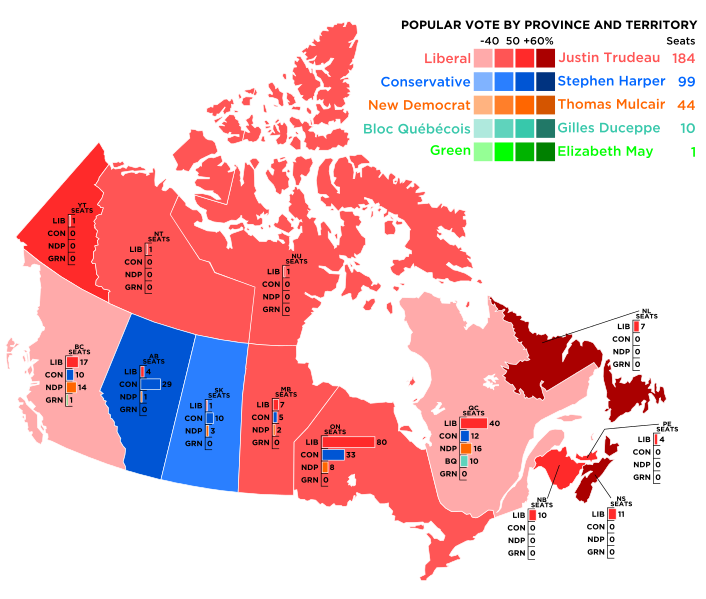Like this article? rabble is reader-supported journalism. Chip in to keep stories like these coming.
(It’s been a while since I last blogged. In December, I became President of Fair Vote Canada.)
Prime Minister Justin Trudeau’s Liberals and government have promised real change when it comes to how Canada elects the House of Commons. Trudeau recently said, “I’ve met and heard from far too many Canadians who are frustrated that they don’t feel like their votes count.”
It’s much more than a feeling — it’s a fact rooted in voter inequality. In October, 51% of voters elected no one. They have no Parliamentary legislator accountable to them. No wonder cynicism and skepticism about Canadian politics run rampant.
Nearly 65 per cent of voters supported parties promising to make every vote count in 2019. Canada voted for equal citizenship. The promise was clear in the Liberal, NDP and Green platforms. Prime Minister Trudeau has since affirmed his government’s intention to proceed with an evidence-based, all-party process that will include consultations with voters, non-government organizations and experts about exactly how to deliver Real Change.
This is a once-in-a-lifetime opportunity for democratic reform.
Some opponents of equal citizenship and true representative democracy, whether in the Conservative Party or the mainstream media, have unleashed a barrage of bluster to defend the indefensible — a horse and buggy voting system which effectively disenfranchises half the population.
They threaten to obstruct and delay the reform process by blocking it in the appointed Senate, and demand a referendum without yet knowing what is proposed.
Nobody yet knows what will be proposed.
The starting point for any reasonable cross-country consultation is to identify what needs fixing.
The root problem is voter inequality. The First Past the Post system wastes extreme numbers of votes in every election — about 9 million on October 19. The elected legislators may represent those who voted for them — but who represents the other half of the population?
When we see huge swaths of red, blue and orange on the electoral map, it looks more like an occupation than a representative democracy.
First Past the Post has sentenced many voters to life without representation. The problem afflicts supporters of all candidates and political parties. About 2.8 million Conservative voters cast ineffective ballots in October, as did 2.3 million Liberals, 2.5 million New Democrats, and 500,000 Green supporters.[i] A democratic voting system would include all voters as equals and not divide them into winners and losers. Voter equality in representation, in proportion to votes cast, is the democratic norm in more than 90 countries.
In a real modern democracy, representation is a right, not a prize to be “won.” Effective first choice votes should determine the makeup of the House of Commons.
As Canadians have been so recently and rudely reminded, what flows directly from voter inequality is minority rule. Parties are rewarded with 100% of the legislative and executive power, often with less than 40 per cent popular support. In a representative democracy, government should be formed by legislators chosen by a majority of voters.
What are the values and principles against which we should measure any reform proposal? How will it make every vote count equally? What will Parliament look like? Is every MP elected by and accountable to particular voters? Will future governments start with the conditional support of a majority of voters?
During the election campaign, Trudeau said, “A Canadian is a Canadian is a Canadian.” That principle is enshrined in the Charter of Rights and Freedoms as the right of each citizen to equal treatment before the law. Its full realization requires an immediate end to voter inequality.
There was no referendum on the Charter — nor should there have been. Canadians are now very weary of and wary of minority rule. We are ready and deserve to be governed democratically as equal citizens.
Fair Vote Canada[ii] hopes the Liberal-led reform process will lead to real democratic change
We await with keen interest the Parliamentary Committee’s terms of reference, and the appointments to it, and the assignment of experts, and the budget for hearings and public information.
The clock is ticking toward introduction of voting reform legislation in 2017 — Canada’s 150th birthday year.
The frantic Conservative opponents of democratic voting should move past the first stages of their post-election grief — denial and anger — and rethink the future. They should bring better ideas forward. They should stand up for the rights of 2.8 million Conservative voters from large and important areas of Canada — Atlantic Canada, Vancouver, Toronto, Montreal — who are currently denied representation of their choice in the House of Commons.
Gary Shaul is the president of Fair Vote Canada.
[i] http://www.wastedvotes.ca/?q=node/2/Federal/42/0/TOP
[ii] Fair Vote Canada is a multi-partisan and non-partisan advocacy and public education organization focused on voter equality and proportional representation.
Image: wikimedia commons/NoName2
Like this article? rabble is reader-supported journalism. Chip in to keep stories like these coming.



